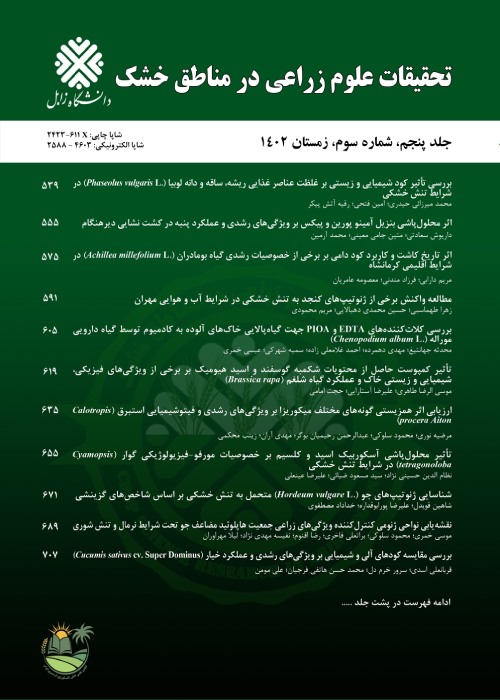The effect of drought stress and potassium sulfate on seed yield and physiological traits of quinoa plant
The quinoa plant (Chenopodium quinoa Wild) belongs to the Amarranthaceae family. This plant has a high nutritional value and shows tolerance to abiotic stresses such as drought and salinity. Drought stress is known as an important environmental stress that creates serious limitations for crop production all over the world. Drought stress may cause the production of reactive oxygen species in plants, which damages lipid and protein structures and causes the cell membrane to lose permeability and selectivity. Potassium is a mineral substance that is necessary for various biophysical and biochemical processes. It is important for the production of crops and can be a limiting factor for the production of crops under certain environmental conditions such as salinity and drought. Quinoa plant is somewhat resistant to drought and Kerman province is considered one of the dry areas. Therefore, cultivation of drought-resistant plants and strategies to increase drought resistance and improve agricultural and physiological traits in this plant are necessary. Considering that no research has been done in this field on quinoa plant in the climatic conditions of Kerman region, the present study was conducted to investigate the effect of potassium sulfate fertilizer on seed yield and some physiological traits of quinoa plant under different irrigation treatments.
The experiment of split plots based on randomized complete blocks design with three replications was conducted at the station of Research in the 2020-2021 crop year, Agriculture and Natural Resources Center in Kerman province of Iran. The main factor included three levels of irrigation treatment (irrigation to the full maturity stage (control), irrigation to the beginning of the flowering stage, and irrigation to the dough development stage) and the secondary factor included two levels of potassium sulfate fertilizer, including its application and non-application. Physiological traits including the content of chlorophyll a and b and carotenoids, ion leakage, malondialdehyde content and the activity of enzymes such as catalase, ascorbate peroxidase, peroxidase, polyphenol oxidase was measured. After confirming the normality of the data, the errors were also checked for normality. Then variance analysis of all traits and LSD mean comparison test at five percent level was performed with SAS software version 2.9.
The effect of irrigation factor and potassium sulfate on seed yield and all measured physiological traits (content of photosynthetic pigments, chlorophyll a, chlorophyll b and carotenoids), activity of antioxidant enzymes (catalase, peroxidase, ascorbate peroxidase and poly phenol oxidase), electrolyte leakage and malondialdehyde content) were significant. The highest seed yield (230.9 g/m2) was observed in control plants and the lowest (136.6 g/m2) in plants grown under irrigation conditions to the beginning of the flowering stage. Drought stress decreased the content of photosynthetic pigments and increased the activity of antioxidant enzymes, electrolyte leakage and malondialdehyde content. The application of potassium sulfate caused an increase in the seed yield compared to its non-application in all three irrigation treatments by an average amount of 25.8%. Physiological traits also improved with the application of potassium sulfate.
The yield of seeds and the amounts of photosynthetic pigments decreased in proportion to the increase in drought stress, and the ion leakage and malondialdehyde content increased, which indicated the harmful effects of this stress on growth parameters, photosynthetic apparatus, and cell membrane stability. The activity of antioxidant enzymes increased under stress conditions, which indicates the enzymatic defense responses to oxidative stress. The application of potassium sulfate led to the improvement of seed yield and physiological traits in both normal and drought stress environments alike. Due to the fact that drought stress affects the physiological traits and ultimately leads to a decrease in the seed yield of the quinoa plant, potassium sulfate fertilizer was used to compensate for its harmful effects.
- حق عضویت دریافتی صرف حمایت از نشریات عضو و نگهداری، تکمیل و توسعه مگیران میشود.
- پرداخت حق اشتراک و دانلود مقالات اجازه بازنشر آن در سایر رسانههای چاپی و دیجیتال را به کاربر نمیدهد.


